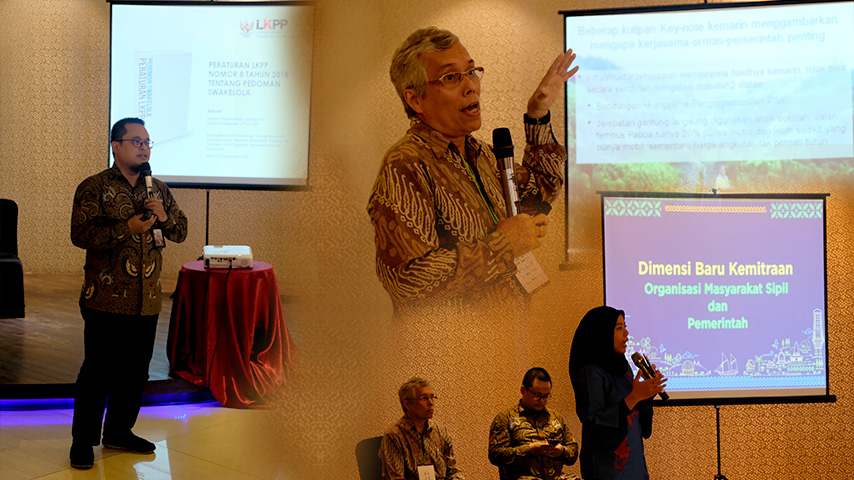Makassar - the Presidential Decree Number 16/2018 concerning Public Procurement opens a new dimension that moves toward a more inclusive and participatory development. This new decree has served as an "entrance" to a more synergized cooperation between government and community organizations which will hopefully lead to the improved public services delivered to people at the grass root level.
This view was articulated in a talkshow titled "New Dimensions of Partnership between Government and Civil Society Organizations" held by AKATIGA in collaboration with Knowledge Sector Initiative (KSI), in Makassar, South Sulawesi, Thursday (10/25/2018) . The event which was a series of activities at the Eastern Indonesia Forum Festival (Eastern Indonesia) VIII discussed the opportunities and challenges in the partnership between the government and civil society organizations in relation to the implementation of this presidential decree.
In the interactive talkshow, the Head of Construction Planning and Supervisory Section of the National Public Procurement Policy Agency (LKPP) Seno Haryo Wibowo revealed that the involvement of CSOs in public procurement constitutes an effort to strengthen participatory and collaborative development. "With this partnership (between the government and civil society organizations), we are both creating an inclusive economy. And that is the purpose of development. All are empowered, everyone is involved, "Seno said.
Seno explained, the limited human resources and competency made the government unable to cover all aspects of development, particularly those related to the human development index (HDI). For this reason, in public procurement which constitutes one of the most important elements in development - the government aimed at strengthenin the self-management scheme. If previously the scheme could only be carried out by government agencies and the private sector, pursuant to Presidential Decree 16/2018 - which replaced the Presidential Decree 54/2010 - CSOs could now become the "main actors" in development projects.
This massive reform effort began in mid-2014 when KSI helped liaise LKPP with its partner institutions. A series of studies and discussions were conducted. Facilitated by KSI, AKATIGA, a research and advocacy organization, Center for Law and Policy Studies (PSHK) and the Society for Research and Advocacy (ELSAM) collaborated with LKPP to identify and analyze challenges faced by NGOs and provided inputs to inform policy and regulatory reform.
This progressive decree is expected to change the existing paradigm and the common perspective toward CSOs. CSOs will no no longer be external parties, wiith only check and balance function: they are now co-implementers of development projects. "As stated by the President (Joko Widodo), collaboration and participation are needed to achieve development goals. As a self-managed implementer (Type 3), they are an extension of the government in implementing the program, "Seno said.
The involvement of CSOs public procurement is deemed important because they are considered to have competence, knowledge, professionalism, and they can reach out to various development issues or problems. "These issues are very numerous, ranging from poverty, health services, education, to disaster management. If everything has to be done by the government, it will be too heavy. Therefore, collaboration with CSOs is compulsory. However, trust needs to be established beforehand," said Isono Sadoko (Sonny), AKATIGA senior researcher who was also one of the speakers in the talkshow.
Building CSO’s Competence
Also, Seno and Sonny agreed that CSOs have to be strengthened, in terms of their competence and integrity. This is important because public procurement is done through tenders and best bidder will be selected as winner of the project. This will create tight competition among bidders with competence in the areas of the project tendered. "So, CSOs submit their proposal, and they will compete to show that their programs, their method of implementation is the best. Then, the government (through an external technical team) will determine who will be nominated as the winner of the project, "said Seno.
According to Sonny, quite a number of CSOs in Indonesia who are professional and have knowledge and skills to deal with development issues. "Muslimat NU (Nahdlatul Ulama), for example, has been working since before Indonesia became independent. They are capable of managing schools and hospitals. The Corruption Eradication Commission (KPK) relies on the collaboration they establish with local CSOs. In remote areas, these organizations can play many roles," said Sonny.
In the discussion session, many participants asked about technical matters related to Type 3 self-management scheme, starting from how to prepare proposalsand submit them, and what requirements CSOs to fulfill to make them eligible to participate at the tender process. They hope that more workshops and disemmination events on new regulations, such as those KSI has facilitated so far to improve research-based public policy making, will be held in the future.






